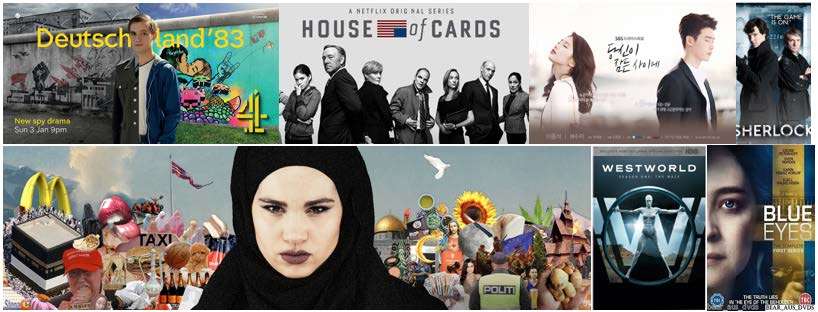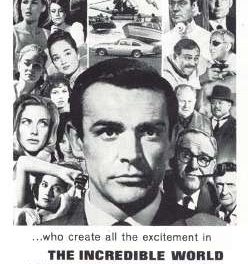In 1992 television researcher John Ellis stated that television was an “essentially national activity for the vast majority of its audience”. Since then we have witnessed a development that follows the logics of transnationalism: Television content is still produced locally – that means it is produced within specific countries under specific national laws and media regulations, and often first for a local market. But if we start to look at the principles behind production, distribution ownership or audiences, we can uncover mechanisms that are not bounded or organized by national borders and regulations but follow transnational or even supra-national cross-ownership structures and interrelations but also viewing practices. This is reflected in trademarks like “quality drama”, “subtitled drama”, or “Nordic Noir” such as Borgen, Breaking Bad, Grand Hotel or Deutschland 83 (mainly national productions with a global audience), Sherlock or Outlander (international co-productions), The Team, The Night Manager or Borgia (transnational co-production). It is reflected in the reception when, for example, television drama series are successfully adapted or watched via multiple platforms by diverse global audiences. It is reflected in multinational productions groups such as the worldwide operating Endemol Shine Group; in the endeavour of channels and production companies to produce and distribute with a bigger audience in mind, in the increasing tendency to gather money and competencies in European or international co-productions; in the new possibilities of accessing global content via various platforms such as Netflix, Amazon or YouTube; in the increasing practice of exchanging creative personnel, and, not least, in themes and aesthetics that entail an appeal that reaches beyond local and national boundaries.
Transnational tendencies thereby have been and will be an integral part of television – not only in the Western markets, but also in other global regions. Turkey, for example, became the biggest exporter of television lately, with its television formats travelling to the Arabic regions but also worldwide. And KDrama, Korean television drama, has proved highly successful across and beyond Asia, entering the Middle East and the American market. The scale and scope of transnational aspects on all levels of television production and consumption becomes even more significant in an age of globalization, digitization and media convergence.
Thematic concerns include – but are not limited to:
- Tastes and trends in transnational television drama
- Well travelling television drama series – how, why?
- Transnational television audience studies, i.e. viewers, critics, bloggers, fans
- Transnational television production studies, i.e. co-productions, remakes
- Transnational television policies; economy, funding, regulations, digital providers, private and public players
- Television drama as motor for branding and international sale
- Children’s transnational television
- Transnational television drama, cultural proximity and the public sphere
- Televised history, national and European culture
- Creativity and quality in television production
- Transmedia and transnational storytelling
- Landscapes, moods and production design in transnational television drama
- Transnational television drama and tourism
The conference is hosted by the Danish research group What Makes Danish Television Drama Series Travel? (http://danishtvdrama.au.dk) and organised in collaboration with following international research networks and sections:
- Media across borders (Andrea Esser)
- ECREA Television section (Susanne Eichner)
- ECREA Media Industry Section (Hanne Bruun)
- IAMCR mediated communication, Public Opinion and Society (Susanne Eichner)
- NordMedia, Film and Television section (Pia Majbritt Jensen)
Confirmed academic speakers:
- Professor Andrea Esser, Roehampton University, UK
- Professor Sue Turnbull, Wollangong University, Australia
- Assistant Professor Tim Raats, Vrije Univeristeit, Brussels, Belgium
- Professor Trine Syvertsen, University of Oslo, Norway
- Associate Professor Alessandra Meleiro, Universidade Federal de São Carlos, Brazil
- Assistant Professor Yesim Kaptan, Kent State University, US
- Dr Janet McCabe, Birkbeck, University of London, UK
- Professor Jeanette Steemers, King’s College London, UK
- Professor Lothar Mikos, Film University Berlin, DE
- Professor Matt Hills, University of Huddersfield, UK
Hosts and speakers from Denmark:
- Associate Professor Eva Novrup Redvall, Copenhagen University, DK
- Associate Professor Ushma Chauhan Jacobsen, Aarhus University, DK
- Professor Gunhild Agger, Aalborg University, DK
- Associate Professor Anne Marit Waade, Aarhus University, DK
- Associate Professor Pia Majbritt Jensen, Aarhus University, DK
- Associate Professor Jakob Isak Nielsen, Aarhus University, DK
- Associate Professor Susanne Eichner, Aarhus University, DK
- Associate Professor Kim Toft Hansen, Aalborg University, DK
- Marie Curie Fellow Dr Pei-Sze Chow, UK/Aarhus University, DK
- PhD fellow Lynge Stegger Gemzøe, Aarhus University, DK
Deadlines:
Call for papers: Deadline 15 January, 2018. For details, see below.
Feedback: 15 February, 2018
Registration: Deadline 1 May 2018 (online on the conference website)
Submission:
Submissions are welcome in three categories: open call papers, pre-constituted panels, or pre-constituted workshops (details on the website). Send your abstract (max 400 words).
to televisiondramaseries@cc.au.dk.
Costs:
- Conference fee: 1000,- DKK (covers the meals).
- PhD students: 500,- DKK.
Participants cover costs for travel and accommodation.
PhD Pre-conference fee: The event is free, coffee/tea is provided, the participants can buy lunch on campus.
Conference website:
PhD Pre-Conference 6 June 2018 9.00-16.00
PhD networking and career planning. This pre-conference event is an opportunity for PhD students in media and culture studies to network with peers in their field, exchange research experiences and get advice on career-planning by mentors at different stages of their own academic careers. In short: We want to talk about the things we don’t talk about enough! The
pre-conference is organised by Cathrin Bengesser (PhD student at Birkbeck, University of London, UK) in collaboration with Professor Lothar Mikos (Film University Berlin, DE) and Associate Professor Susanne Eichner, Aarhus University, DK. For more details about the pre-conference, see the conference website conferences.au.dk/transnationaltelevisiondrama2018.
To indicate your interest in participating, please send an e-mail to C. Bengesser: cbenge01[at]mail.bbk.ac.uk. (Deadline 15 March, 2018).






